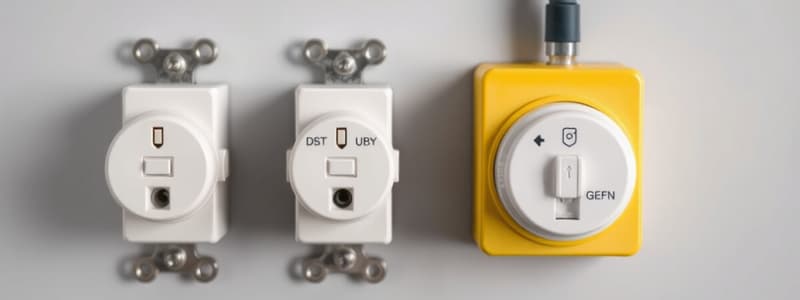Podcast
Questions and Answers
What is a ground fault?
What is a ground fault?
- The failure in a circuit that allows current to flow from a live conductor to ground. (correct)
- A circuit that operates normally without issues.
- An electrical component that enhances circuit performance.
- A fault occurring in a static circuit.
What is leakage current?
What is leakage current?
Low value of current to ground.
What does GFCI stand for?
What does GFCI stand for?
Ground Fault Circuit Interrupter.
What are the two classes of GFCI?
What are the two classes of GFCI?
What does Class A GFCI require?
What does Class A GFCI require?
What is the principle that GFCI operates on?
What is the principle that GFCI operates on?
What is a differential transformer used for in a GFCI?
What is a differential transformer used for in a GFCI?
GFCI does not require a _____ to operate.
GFCI does not require a _____ to operate.
What is the purpose of the test button on a GFCI?
What is the purpose of the test button on a GFCI?
Flashcards are hidden until you start studying
Study Notes
Ground Fault Circuit Interrupters (GFCIs)
- A ground fault occurs when current unintentionally flows from a live conductor to the ground, posing a safety risk.
- Leakage current refers to the minimal amount of electrical current flowing to the ground, which can indicate potential faults.
GFCI Overview
- A Ground Fault Circuit Interrupter (GFCI) is engineered to cut off power when a current-to-ground fault exceeds a specific threshold, typically lower than standard circuit breakers.
- GFCIs are classified into two categories based on their sensitivity:
- Class A GFCIs trip when current to ground exceeds 5 mA.
- Class B GFCIs trip at 20 mA.
Application of Class A GFCI
- Class A GFCIs are mandated by code to protect all outdoor and bathroom receptacles in residential settings to prevent electrical shocks.
Operational Principle of GFCI
- GFCIs operate on the principle that the current leaving a circuit must equal the current entering it; any imbalance represents a ground fault.
Differential Transformer
- In GFCI devices, both live and neutral conductors are routed through a differential transformer to measure current discrepancies.
Ground Conductor
- A GFCI is designed to function without the need for a ground conductor, enhancing its adaptability in various installations.
Testing GFCI Functionality
- All GFCIs must include a test button that allows users to verify the proper functioning of the device and its internal interruption mechanism.
Studying That Suits You
Use AI to generate personalized quizzes and flashcards to suit your learning preferences.



